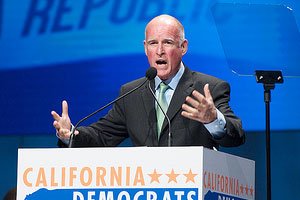Negotiations to let voters decide on whether to continue
temporary tax extensions, which could generate revenue and greatly
dictate the fiscal outlook of Gilroy Unified School District, have
been halted as of Tuesday.
Negotiations to let voters decide on whether to continue temporary tax extensions, which could generate revenue and greatly dictate the fiscal outlook of Gilroy Unified School District, have been halted as of Tuesday.
Gov. Jerry Brown has been trying to organize a special June election where voters would decide on a measure to extend two temporary tax increases and a fee for another five years, which are set to expire July 1, 2011.
If the vote doesn’t take place, this could deeply hurt the Gilroy Unified School District, which might have to face the “worst case” scenario if tax extensions don’t make the ballot: Cutting $6.7 million from their budget.
As of March 18, GUSD was still $355,639 short in cumulative budget reductions in their plan for grappling with the “worst case scenario.”
Some of those cuts would include class size increases and more furlough days.
If tax extensions were to pass, GUSD would have to cut $2.8 million from its budget. GUSD fiscal services has found a way to meet this target.
“If the tax extensions are not placed on the ballot in June, GUSD will have to cut $6.7 million based on what is known at this moment,” confirmed GUSD Superintendent Debbie Flores in an email Wednesday. “However, fiscal analysts that advise school districts have already warned us that there could be a much worse scenario. The Governor and legislature have only dealt with about half of the deficit through cuts.”
If the remainder of the deficit also comes from cuts, she said, K-12 education “will likely be cut even further.”
Everything has been hinging on Brown’s proposed cuts, which included the approval of a temporary 5-year extension on a personal income tax increase, a sales tax increase and a hike in California’s vehicle license fee, which was adopted in 2009.
Without this revenue, flat funding from Proposition 98, which was passed in 1998 and guarantees minimum state funding for schools, could drop by $2.2 billion according to Brian Edwards, senior policy analyst for EdSource – an independent not-for-profit organization whose mission is to clarify complex education issues.
“The budget plan that I put forth is balanced between deep cuts and extensions of currently existing taxes and I believe it is in the best interest of California,” said Brown in a statement released by his office Tuesday. “Under our constitution, however, two Republicans from the Assembly and two from the Senate must agree before this matter can be put to the people.”
Brown contends this route has been roadblocked by Republicans.
“Each and every Republican legislator I’ve spoken to believes that voters should not have this right to vote unless I agree to an ever-changing list of collateral demands,” he said.
He cited one of these deal-breaking “collateral demands” includes the Republican’s request that out-of-state corporations, which “keep jobs out of California,” be given a billion dollar tax break that “will come from our schoolchildren, public safety and universities.”
Brown said this is not something he is not willing to agree to.
On Tuesday evening, Brown released a YouTube message to voters, assuring there is more than one way to meet the state’s budget goal.
“I’m not giving up,” Brown said in the video. “Look, the problem has taken a decade to build up. It’s very serious and it’s going to take some time before we finally solve it. But I’m going to explore every possible avenue have to protect our schools, public safety, public universities and the environment. I’ve been around a long time. I know we can do it.”















